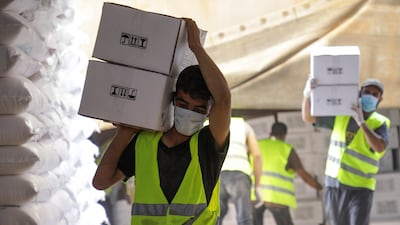Russia on Thursday proposed a draft UN Security Council resolution to extend cross-border aid deliveries into Syria by half a year after rejecting plans from the US and others for a much bigger humanitarian operation.
A draft text submitted by Russia calls for aid to continue flowing from Turkey across the Bab Al Hawa checkpoint for six months and that the mandate could be extended further, after receiving feedback from UN officials.
Russia’s offer falls far short of calls from the US and others for the reopening of other checkpoints that were shuttered last year, but the veto right held by Moscow grants permanent council members considerable power.
A vote on the Russian draft and a competing document drafted by Ireland and Norway that would keep Bab Al Hawa open for another year could come as soon as Friday — one day before the mandate expires.
The row is seen as a test for US-Russia ties after the summit between US President Joe Biden and his Russian counterpart Vladimir Putin on June 16 in Geneva, where the two leaders failed to make headway on Syria aid convoys.
The UN council first authorised cross-border aid operations into Syria in 2014 at four points — Bab Al Hawa between Turkey and Syria’s Idlib region, Bab Al Salam between Turkey and northern Syria, Al Ramtha near the Jordanian border and Al Yaroubia on the north-east frontier with Iraq.
Last year, the council cut that access back to only Bab Al Hawa due to opposition from Russia and China.
The US and others have pushed for Bab Al Hawa to stay open and for aid lorries to enter Syria at Bab Al Salam and Al Yaroubia.
Russia, an ally of Syrian President Bashar Al Assad, says aid should be administered from the capital, Damascus, passing across front lines into the north-west, and that western countries were politicising the issue.
A resolution to extend the mandate needs nine votes in favour and no veto by any of the permanent members: Russia, China, the US, Britain and France.
The north-western Idlib region, accessible, via Bab Al Hawa is the last remaining rebel stronghold against Mr Al Assad's government, which has largely regained control of Syria after a decade of civil war that has left the country in ruins.
The president of the Turkish Red Crescent, Kerem Kinik, on Thursday said the looming closure of Bab Al Hawa was “inhuman”.
“The fate of millions of people in need is likely to be affected negatively by a veto … Such a decision will be unfair and inhuman,” Mr Kinik said.


